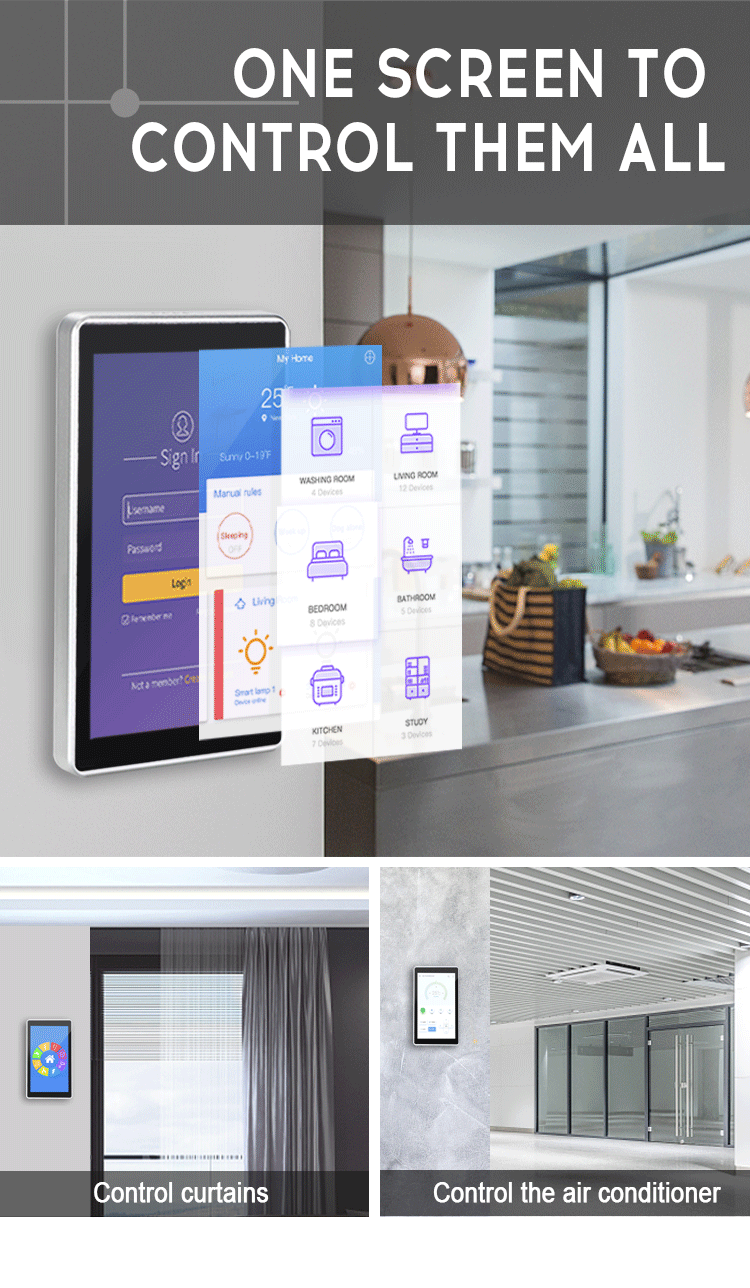What is a smart home management system?
1. Smart Home Management System
A smart home management system is a technological solution that allows homeowners to automatically, control, and control various household appliances and systems from a centralized center, typically using mobile applications or voice commands. This system connects various devices in the home to each other, enabling them to communicate and work seamlessly. The goal of smart home control is to improve comfort, safety, energy efficiency, and overall quality of life.
2. Description of Smart Home Management System
The core of a smart home management system is the ability to centrally manage various smart devices. Smart light bulbs, thermostats, security cameras, entertainment systems, and even kitchen appliances can be integrated into the system. These devices use different wireless protocols such as Wi Fi, ZigBee, Z-Wave, or Bluetooth, allowing users to manage them through one interface.
A typical smart home management system includes:
Centralized hub: The system kernel that connects all devices for communication.
Intelligent devices: devices and appliances that support Internet and remote control.
Software or Application Programming Interface: Users can use it to manage mobile applications or web interfaces for smart home devices.
The smart home management system provides an intuitive way to manage daily tasks, from controlling room temperature to turning on or off lights, all of which can be done through smartphones or voice assistants. The integration of artificial intelligence (AI) and machine learning further strengthens these systems, enabling them to study user preferences over time and automatically perform tasks based on historical data.
3. Application of smart home management system
There are various types of smart home management systems that can be applied to various aspects of home life. Some common applications include:
Lighting Control: The intelligent lighting system allows users to remotely control lighting, schedule on/off times, adjust brightness, and change colors. This helps to save energy and improve the family atmosphere.
Temperature control: Smart thermostats allow homeowners to remotely control heating, cooling, and humidity levels. They can also study user preferences and automatically adjust settings to save energy and optimize comfort.
Security system: One of the most important applications is home security. Smart cameras, motion sensors, door locks, and alarm systems can be remotely tracked. If suspicious activity is detected, an alert will be sent to the owner’s mobile phone.
Home entertainment: Audiovisual devices such as smart TVs, speakers, and media players can be integrated into the control system. It allows users to easily move content, control volume, or manage entertainment settings.
Control appliances: Smart kitchen appliances such as ovens, refrigerators, and coffee makers can be remotely controlled to make cooking simpler and more efficient.
Energy management: Smart home systems can monitor the energy consumption of different devices, providing information that helps reduce energy consumption and lower utility costs.

4. The role and advantages of smart home management systems
The key role of a smart home management system is to make daily life more comfortable, efficient, and safe. Here are some main advantages:
Convenience: With the smart home management system, users can manage multiple devices from one platform. Convenience is one of the most attractive technologies for smart home, whether the mobile phone turns off the light or adjusts the thermostat during work.
Energy efficiency: Automated systems only provide lighting, heating, and cooling systems when needed. By learning user habits, smart devices can adjust settings to optimize energy consumption, resulting in significant energy savings.
Enhanced security: Smart security devices allow homeowners to monitor their properties in real-time. With a smart lock, you can remotely lock/unlock the lock, and with a camera, you can check your house at any time to calm you down.
Customization and automation: Smart home systems can be adjusted according to specific needs and preferences. Automated rules can be set to perform certain operations, such as turning on lights during motion detection or lowering blinds at sunset.
Usability: Smart home technology can improve the usability of elderly or disabled people by allowing voice or remote control of basic homework. This increases the independence and comfort of daily life.
5. Issues and considerations
Although the advantages of smart home management systems are obvious, there are still some challenges:
Compatibility issue: Not all smart devices are compatible, so it is important to choose devices that work together in the same ecosystem, such as Google Home, Amazon Alexa, or Apple HomeKit.
Security risk: Like any network device, smart home systems are vulnerable to hacker attacks or data leaks. It is crucial to choose a system with strong security protocols and regularly update software to reduce these risks.
Cost: The initial investment in smart home technology can be high, especially if multiple systems and devices are required. However, these costs can be offset by long-term energy efficiency and convenience savings.
6. The future of smart home systems
With the continuous development of technology, the future of smart home control systems looks very promising. Artificial intelligence and machine learning will play an important role in making these systems more intuitive, predictable, and personalized. In addition, integrating voice assistants such as Amazon Alexa, Google Assistant, and Apple Siri into the smart home ecosystem will further simplify user interaction.
Smart homes can be better integrated with other aspects of daily life, including health monitoring, home automation in multiple locations, and energy consumption prediction. With the arrival of the Internet of Things (IoT), smart home management systems will further develop to connect more devices and provide greater control, security, and efficiency.
7. Conclusion
The smart home management system is a revolutionary technology that makes home automation more affordable, convenient, and useful. Whether it’s lighting control, safety control, or automated appliances, smart home systems provide a simplified way to manage modern living spaces. If you would like to learn more about smart homes, please feel free to check out our blog articles. Portwold hopes to help you and answer any questions you may have.


